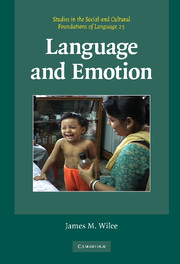Book contents
- Frontmatter
- Contents
- List of figures
- List of transcripts
- Acknowledgements
- Introduction
- Part I Theory
- Part II Language, power, and honor
- 5 Language, emotion, power, and politics
- 6 Status, honorification, and emotion for hire
- Part III Identification and identity
- Part IV Histories of language and emotion
- Notes
- Glossary
- References
- Index
- STUDIES IN THE SOCIAL AND CULTURAL FOUNDATIONS OF LANGUAGE
5 - Language, emotion, power, and politics
Published online by Cambridge University Press: 05 June 2012
- Frontmatter
- Contents
- List of figures
- List of transcripts
- Acknowledgements
- Introduction
- Part I Theory
- Part II Language, power, and honor
- 5 Language, emotion, power, and politics
- 6 Status, honorification, and emotion for hire
- Part III Identification and identity
- Part IV Histories of language and emotion
- Notes
- Glossary
- References
- Index
- STUDIES IN THE SOCIAL AND CULTURAL FOUNDATIONS OF LANGUAGE
Summary
Introduction
In Part II (Chapters 5 and 6) I explore the relationship of language and emotion with power. Dominant Western discourses have historically associated emotion with femininity, vulnerability, and weakness (Lutz 1986). Martin (2000), however, points to evidence that these associations may have flipped. She argues that “loss of control” – once associated with weakness, and with women – may now be the prerogative of alpha males in the guise of wild bulls. Martin's indirect allusion, here, to stock markets (bullish ones) is intentional. The stock market, Martin (2000: 578, citing Pocock 1985: 112–113) writes, is “a pathologically unstable force [that has] placed ‘politics at the mercy of a self-generated hysteria (in the full sexist sense).’” The market (surely a central locus of power in late capitalism) must be driven by “male passions that might need to be out of control to be powerful in the market – to manifest themselves in the form of the male manic as a potent, risk-taking entrepreneur” (Martin 2000: 581).
What about the politics of emotion in American presidential elections? Ed Muskie (a Democratic Party candidate in 1972) self-destructed when, “trying to express anger” as his wife was being rhetorically attacked during the campaign, he cried on television (Reddy 1999: 271). But in the January 2008 New Hampshire Democratic Presidential primary, pundits widely attributed Senator Hillary Clinton's victory to her becoming tearful when a voter asked how she was holding up. Such incidents have not received much anthropological attention. But one wonders whether, today, other anthropologists would describe it in quite the way Lutz did (“Tears … are expected at funerals but not in political contexts,” Lutz 1986: 306).
- Type
- Chapter
- Information
- Language and Emotion , pp. 87 - 99Publisher: Cambridge University PressPrint publication year: 2009

